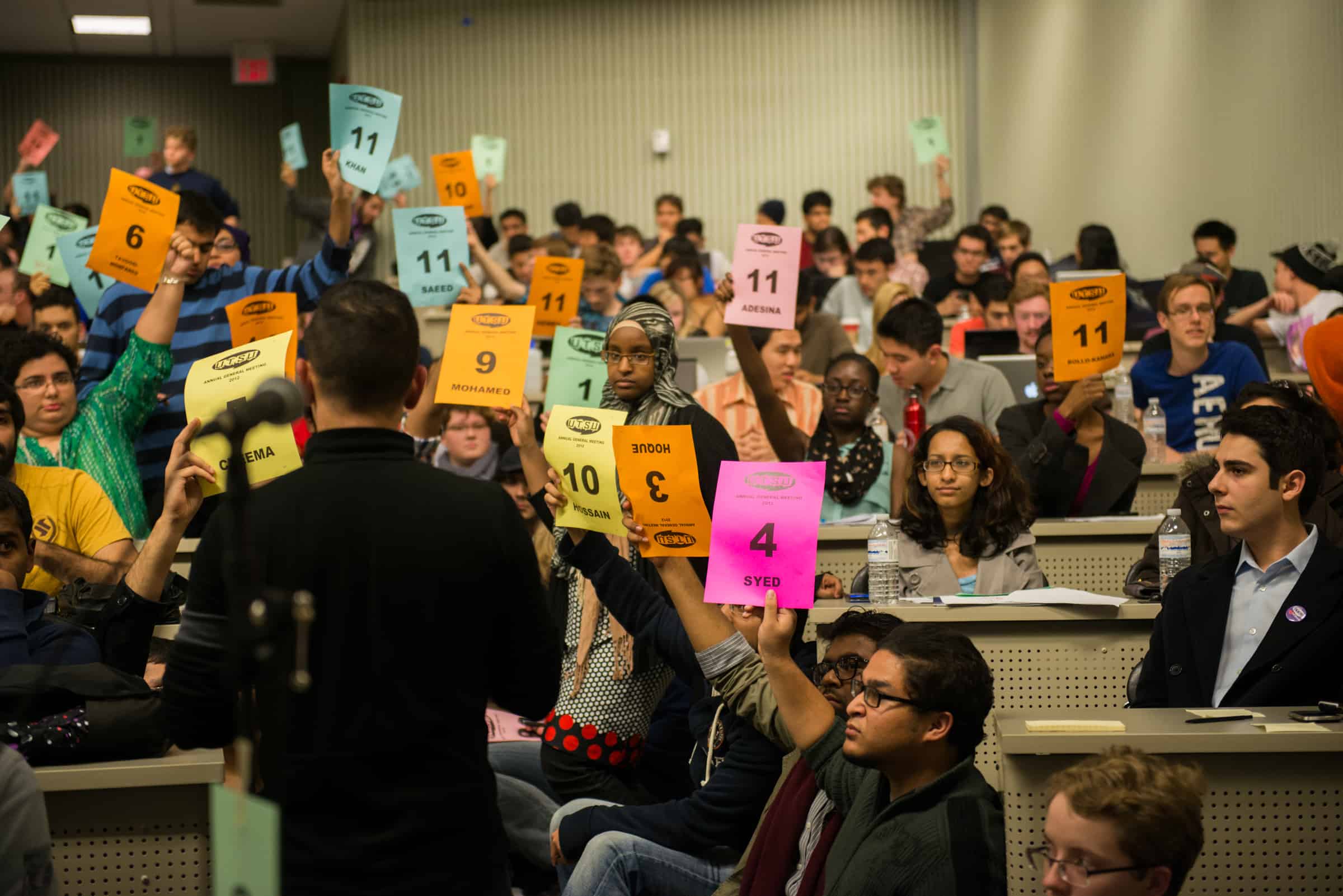With the deadline looming to submit bylaw amendments to the University of Toronto Students’ Union, campus opposition figures have indicated that they will put forward the four original motions that were absent from the agenda of November’s abortive annual general meeting — but little else.
After a majority of voters refused to approve the UTSU’s agenda at the AGM in November, union executives called for a new general meeting, to take place in late January. The deadline to submit amendments is this Tuesday, January 8. As of press time, only the four original motions had been submitted for inclusion on the replacement agenda, as well as routine business carried over from November’s failed agenda.
“We deliberately designed this [submission procedure] to give us lots of time to process the amendments,” said UTSU president Shaun Shepherd, adding that the date of the general meeting has yet to be finalized.
In an interview, Shepherd acknowledged that union executives intended to address the issues raised at the time of the last AGM. The outcome of the last meeting was “unprecedented in the history of the UTSU,” said Shepherd, and had motivated a desire “to ensure the next one goes smoothly, by understanding these issues in advance.”
Shepherd has also been engaged in private meetings with college council leaders, in an effort to resolve some of the deeper issues that have soured the relationship between the colleges and the central student union. The meetings, which began in December, have been infrequent due to scheduling difficulties.
The four opposition-driven amendments, submitted by Trinity College co-head Samuel Greene and seconded by president of the University College Literary and Athlectic Society President Benjamin Dionne, address mainly procedural issues, such as ending the practice of proxy voting on the union’s board of directors, and reducing the number of signatures required to run for executive office at the union.
Before coming to a vote at the general meeting, submitted amendments must be approved by the Policy & Procedures Committee, and then by the UTSU Board of Directors. The Board of Directors will meet on Monday to discuss and approve the agenda for the January general meeting.
Greene’s four amendments are likely to be on the agenda, but it was unclear whether last-minute amendments submitted in the 48 hours before the deadline would also win approval before the late January meeting.
“Committee dates are internal, so they’re not publicized,” said Shepherd, also explaining that while anyone who submitted an amendment would not generally be permitted to attend the committee meetings, they could request to make a presentation.
Despite having the backing of prominent opposition leadership members like Greene and Dionne, the four amendments do not address a growing movement calling for online voting, which could radically reform union elections in a way that current pending amendments would not.
For those who have been lobbying to reform the union’s electoral system, time is running short. Greene says that he is still concerned about the timeline. “For a long time, the way advocates of reform have been responded to is delay and delay and delay, and we graduate and they carry on as students.”
Many of the student leaders who are calling for such reforms, including St. Michael’s College Student Union president Mike Cowan, Engineering Society president Rishi Maharaj, and UCLit president Dionne, intend to graduate at the end of the school year. Shepherd has repeatedly promised to implement electoral reform before this year’s UTSU election.
In response to growing calls for electoral reform, the union opted to hire a lawyer to conduct a review of current electoral procedures and policies. Publicly, the union has maintained that they will take no formal position while the lawyer is conducting the review. The review is anticipated to cost $17,000, and was approved with no due date.
Several members of the UTSU executive have candidly expressed their concerns about online voting at previous Elections & Referenda committee meetings.
According to the minutes, Munib Sajjad, vice-president, university affairs, said that online voting “is often a misunderstood procedure.” Sajjad also suggested that, when implemented, “voter turnout usually decreases over time and the system is not entirely secure.” Other executives have previously indicated their opposition to online voting, including vice-president, internal and services Corey Scott.
Greene is frustrated by the difference between the public and private stances. “If the UTSU were willing to have a real discussion about this, I would submit to you that they should come out and say we oppose X, Y, and Z proposals, and here is why,” said Greene. “My suspicion is that the legal review will drag the process out to the point where there will be excuses, excuses, excuses until at election time nothing has changed.”


